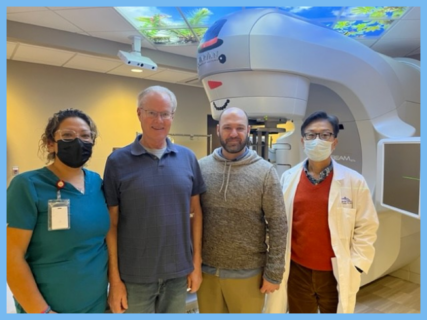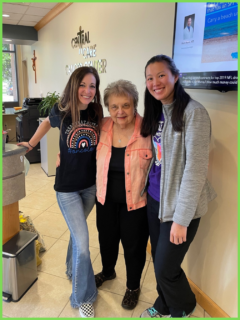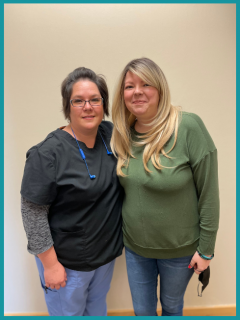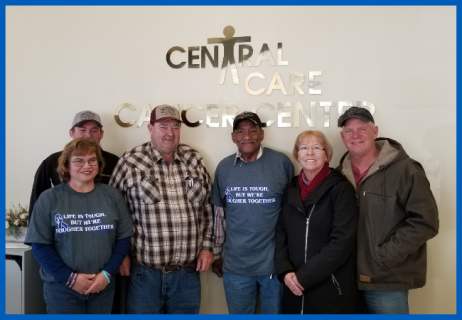
Steven Kuhlman
Two years ago, 69-year-old Steven Kuhlman went in for his regular PSA check and his doctor, Dr. Showengerdt, told him that the number was somewhat high. They decided to perform more frequent PSA checks over the next year and in the summer of 2021, Steven’s PSA number rose to a concerning level. He got an appointment with an urologist and a biopsy revealed that he had prostate cancer and needed a prostatectomy.
Because Steven had no symptoms, it took him a while to follow his doctor’s advice and get the biopsy. Upon doing his own research, he discovered online forums where people could discuss their personal experiences with prostate cancer. “It made me realize those guys got it a lot worse than me, so I better follow instructions and work my way through this process,” says Steven.
Speaking with his wife, Brenda, and a coworker who was also diagnosed with prostate cancer, helped Steven understand that he needed to face this problem head on and take the necessary steps toward getting healthy again. “When he learned that I had prostate cancer, we talked on the phone two or three times and he was very encouraging,” says Steven.
In December of 2021, Steven received his prostatectomy from Dr. Faris Azzouni in Dodge City, KS. Everything was going well until a follow up PSA test revealed that the number was rising once again. At this point, Steven had no choice but to begin radiation treatment. “I didn’t want to go to Wichita or other places,” he says. “I like to stay local and I knew your facility was in Garden City, so I told Dr. Azzouni I wanted to go to Heartland Cancer Center.”
Prior to his cancer diagnosis, Steven never had any health problems, aside from knee replacement surgeries. “I’ve been very fortunate; I’ve been a very healthy person other than my knees,” he explains. “I’ve hardly ever been to a doctor or hospital, so it was kind of a new deal for me to get into that environment.”
In October of last year, Steven began radiation treatment at Heartland Cancer Center with Radiation Oncologist Song-Chu Ko. “I kind of told him that I wasn’t happy about all this, that I thought once my prostate was removed I was done and I didn’t really want to be here,” Steven explains. “Of course, he explained to me that since I am in good health and I’m 69 years old, that we needed to deal with this to save myself from future problems with cancer. I was glad that he didn’t talk me into it, but I was on the edge and he made me comfortable with doing the radiation.”
Steven continued with daily radiation treatments for the next month. Based on the research he did, he felt that he experienced very mild side effects. “My side effects from radiation were minimal in comparison to some of the things that I read,” he says.
As a huge proponent for supporting local businesses, Steven was grateful that he was able to receive his treatment close to home. “I was born and raised in Western Kansas and I feel like we need to support our Western Kansas medical facilities as much as possible,” he explains. “I’m glad I stayed in Western Kansas because I had good service.”
Fortunately, Steven’s workplace was very understanding of his situation, and allowed him to take Fridays off in order to make it to his appointments. “My employer worked with me completely, so I was never late and as soon as I walked in there [Heartland Cancer Center] – they run things pretty timely – I got right in, got my radiation, and moved on out of there,” says Steven.
Steven was a service technician at Century Business Technologies for 17 years, but retired at the end of December. He hopes to spend his retirement further exploring the history of Western Kansas along with his wife, Brenda. “I’ve loved that stuff for most my life and I’d like to spend more time on the Old West history of Kansas,” Steven says.
Steven finished his radiation treatments at the end of November, and continues to get quarterly PSA checks in order to make sure that the cancer does not return. With a clean bill of health and his recent retirement, he plans to move on from this and spend more time enjoying his hobbies with his wife. “I’m glad that I went to Heartland Cancer Center and that your staff was there because it just worked out good for me,” he says.
When asked what advice he had for someone who might be diagnosed with cancer, Steven says, “Talk to people, and that’s what those forums are good for, because you’ll realize there’s other guys who probably got it a lot worse than you. You don’t want to keep it to yourself.”
Heartland Cancer Center is dedicated to keeping cancer care close to home with the latest technology and treatment techniques. Our expert team of physicians and staff is committed to providing support services and compassionate care for each patient, remaining true to our goal of providing treatment equal in quality to that found in major metropolitan areas.
April 13, 2023
Gerri West
Gerri West, a lifelong resident of the Great Bend area and cancer survivor, lives by the “Three P’s: positivity, prayer, and people.” This motto has gotten her through a lot, including her 24-year battle with a lymphoma diagnosis, five separate rounds of chemotherapy and five remissions.
In 1998, Gerri noticed a lump in her neck, near her jaw. She thought it might be a dental issue, so she went to her dentist who recommended that she see a medical doctor. After a biopsy and surgical removal of a lymph node, Gerri was diagnosed with Stage 1 non-Hodgkin’s lymphoma.
At the time, Gerri was scared and had a difficult time understanding why this would happen to her. “I have to admit when I was first diagnosed, I was angry,” Gerri says, “I couldn’t believe it. I thought, ‘Why me? Why me, God?’ That didn’t last real long, and I came up with the idea of the three P’s: positivity, prayer, people. Because with any situation, if you’re positive, your outcome is going to be better.”
A few months later, armed with her new motto, Gerri began her first round of chemotherapy and experienced some very difficult side effects. She quickly felt extremely nauseous and lost most of her hair, which was devastating for her. “I wasn’t completely bald, so I went to Michelle Pedigo [Cosmetologist, Blades Salon],” Gerri explains. “She had just gotten out of beauty school. I was one of her first clients and I had her give me a buzz because I just had tufts of hair, you know. It was hard.”
Under the care of Dr. Greg Nanney, Medical Oncologist at Central Care Cancer Center, Gerri was receiving a chemotherapy drug nicknamed the ‘Red Devil,’ for its bright red color. She stayed strong, made it through her chemotherapy regimen and was in remission in 2007. Unfortunately, that was not the end of her cancer journey. Gerri’s cancer came back in her groin in 2011, which required the surgical removal of at least 10 lymph nodes and more chemotherapy. This time, a new chemo drug called Rituxan was available and she was able to avoid the ‘Red Devil.’
Over the next 7 years, Gerri went through several rounds of chemo, along with Intravenous Immunoglobulin (IVIG) treatments for an immunodeficiency disorder, and although there were some bumps in the road, she remained hopeful and kept in mind the ‘Three P’s.’ However, in 2018, her cancer spread to her bone marrow and she began her fifth regimen of Rituxan.
When Dr. Mark Fesen, Medical Oncologist, joined Central Care, he recommended that Gerri try exercising to reduce the stress of chemotherapy and she began taking classes at Inspire Fitness in Great Bend. Not only does exercising help her feel better physically, but it also helps keep her spirits up during difficult times. “I’ve been going [to Inspire Fitness] about four or five years now and I love it,” says Gerri.
Gerri has been seeing Dr. Fesen since 2010, and she values his advice greatly. “He’s very forthright, he looks out for his patients, and they’re number one,” Gerri says. “He’s always got the latest knowledge and tells you like it is, because there’s no sense in sugarcoating things. I want to know the facts, so I appreciate him immensely.”
Dr. Fesen and Central Care are dedicated to keeping expert cancer care close to home. With the latest technologies and treatment techniques, Central Care provides comprehensive cancer care to the Great Bend area. “I feel that the community is really blessed to have Central Care Cancer Center here,” Gerri goes on, “It is a great addition. You don’t have to travel, and even for the small counties around us, it’s
closer to come here than Kansas City or Wichita. You’re more likely, if you’re in treatment yourself, to be
able to handle that. I would recommend this cancer center to anyone. It’s top-notch.”
Central Care also utilizes Telemedicine in order to get second opinions from outside specialists, which
further eliminates the need for travel. “Here, I was able to consult with Dr. Suman Kambhampati by
video, instead of going to Kansas City,” Gerri says. “He’s a blood cancer specialist. Dr. Fesen is very good
about getting all the information he can.”
Fortunately, Gerri has a very supportive family by her side through everything. Her son has been her
number one supporter since the beginning, and the addition of his wife and children to their family has
continued to lift her spirits while she undergoes treatments. Gerri’s also an advocate for massage
therapy, and says it helps her feel better while she experiences the side effects of chemo. “I’m a great
believer in massages, and she [Liz Bowman at Symmetry Massage] is one of the best I’ve ever been to,”
she says.
Gerri is surrounded by great people, who helped her immensely at the beginning of the COVID-19
Pandemic. She works for the Great Bend City Prosecutor, so working from home was not an option, but
between her cancer diagnosis and immunodeficiency disorder, getting COVID was a big concern for her.
“It was very scary, but they were great at work,” Gerri explains. “They moved me to my own office way
back in the building, kind of off by myself. Everyone wore masks and used hand sanitizer, and everybody
was just looking out for each other.”
As of now, Gerri is in remission and continues to remain positive. When asked what advice she has for
someone who might be diagnosed with cancer, she says, “It’s a club you never wanted to join, but
you’re a member. As soon as possible, be positive, pray, and be around people.”

Juliana McClellan
Juliana McClellan has always been on top of her regular Pap tests and cervical cancer screenings, not only because it is important for her own health, but also because she has a family history of endometriosis, a common gynecological condition. That’s why when she experienced a longer-than-usual menstrual cycle with heavy bleeding, she assumed endometriosis was the cause. However, in November of 2021, a Pap test revealed that a mass on her cervix was actually the cause of the bleeding. Shortly thereafter, Juliana was diagnosed with Stage 4 cervical cancer.
After her gynecological oncologist, Dr. Jacqueline Morgan, referred her to Central Care Cancer Center in Emporia, Juliana found herself in an exam room, being told that she would need immediate radiation treatment. She was scared, confused, and worried. “The first 15 minutes, I was just trying to wrap my head around everything, like how to tell my kids,” Juliana says, “Thankfully, my fiancée was there.”
A 35-year-old mother of three boys and engaged to be married to the love of her life, this seemed like an impossible situation, one that she was not ready to overcome. That was until she went outside, took a moment, and had a conversation with Oncology Assistant Mandy Springeman. “Mandy, just from day one, she held me and cried,” says Juliana, “You know, she’s a cancer survivor too and being able to have somebody in that moment when I was diagnosed, tell me that I was where I needed to be and that I would be okay, was just music to my ears.”
Central Care Cancer Center is dedicated to keeping cancer care close to home. Our expert team of physicians and staff, coupled with the latest technology and treatment techniques, allow us to provide an unmatched level of care to the Emporia area. At Central Care, the patient is the top priority.
Within a week of her initial diagnosis, Juliana began receiving radiation treatment to her pelvis in order to stop the bleeding. Less than a month later, she also began chemotherapy. Aside from losing her hair, she didn’t experience many difficult side effects. “I, of course, did not feel great,” she says, “But, aside from exhaustion and joint and bone pain, I didn’t really get sick. I didn’t experience those horrible side effects that some do. I feel very blessed that we were all able to manage my symptoms very well.”
Juliana continued chemotherapy treatments every 21 days until her last treatment on April 1st of this year. Due to the fact that her PET scan on March 15th was clear of disease, she no longer needs chemotherapy and remains on a maintenance schedule in which she receives the antibody, Keytruda, every 21 days. Keytruda helps the immune system detect and fight cancer cells, which is important in this stage, in order to prevent Juliana’s cancer from returning. She credits the management of her symptoms and the success of her treatment to Dr. Elshami Elamin, medical oncologist at Central Care. “I appreciate the treatment plan he put together, as I am now NED [no evidence of disease], and feel that was based on his treatment plan and my own personal strength,” says Juliana.
Not only did she rely on her own strength, but she also relied on the strength of her family and community members during her battle with cervical cancer. Her sons, Brayden, Samuel and Maddox, remain beacons of positivity for her, and she can’t wait to marry her fiancée, Nathan, in June. “He’s amazing, he’s really been my rock,” Juliana says.
As a citizen of Council Grove and native of Kansas City, both communities stood by Juliana during her cancer journey. “I have a fantastic support system,” she explains, “Our friends and family that live in Council Grove and Kansas City, plus our whole community—I mean, I can’t tell you how many people in Council Grove were so very active in some form of my care during these past few months.”
“My mom, she practically moved in with us over this time to help with the kids and everything,” Juliana adds, “My grandma, she is a cancer survivor as well, so she’s just a big pusher in positivity and prayer, and just overall amazing. I can’t say enough things about the family, they’re top-notch.”
Receiving a cancer diagnosis and experiencing the side effects of treatment can feel very defeating. However, Juliana had an army of supporters and a team of physicians who helped lift her up during this difficult time. “It just makes my heart so full,” she says, “I feel so very loved, and you know, it picked me up when I was in a really dark place in the beginning.”
When asked what advice she has for others who might receive a cancer diagnosis, Juliana immediately says, “Stay off Google. Stay as positive as you can. I know it’s hard in the moment, but that really was a game changer for me. Just staying positive,” she goes on, “Oh, and I found an online support group. It was a cervical cancer support group and those women helped me through my darkest days, answered questions that nobody else really could answer for me because they were all in my shoes in some form or another.”
Remaining positive during her treatment became extremely important to Juliana. Thankfully she had the help of Mandy, as well as Nurses Brooke Wilson and Megan Beitz. “I really don’t have enough wonderful things to say about the three of them,” she says, “They’ve been able to answer every question, they went over every scenario with me, just held my hand when I needed it and they, too, were all very positive. You know, nobody was doom and gloom. I was exactly where I needed to be and they were exactly who I needed in my corner. I’m so very blessed.”
Moving forward, Juliana will continue her antibody treatments every 21 days for the next 2 years. Along with her on this maintenance schedule is, what Juliana calls, her “dream team”: Mandy, Brooke, Megan, Physician Assistant Ayesha Ahmed and Medical Oncologist, Dr. Anis Toumeh. “Dr. Toumeh is absolutely amazing and I’m so happy he is taking over my care,” she says, “I love his personality, his fashion and his willingness to talk to me. I think he’s just brilliant and I wholeheartedly trust him.”
According to the American Cancer Society, getting regular screening tests, such as the HPV test and the Pap test, is the best way to find cervical cancer early. Early detection greatly improves the chances of successful treatment. “Annual checkups are so crucial,” says Juliana, “Your health has to be a priority.”
Due to Juliana’s enrollment in Kansas’s Early Detection Works Program (EDW), she was able to get screening tests for breast and cervical cancer, including clinical breast exams, mammograms, pelvic exams, Pap tests and HPV tests. The EDW Program also covers diagnostic tests if a screening test shows a potential problem. Visit kdheks.gov/edw or call toll-free 1-877-277-1368 to learn more about the program or to find out if you are eligible.
June 21, 2022
Pete Krier
Pete Krier really knows how to throw a party. The Claflin, Kansas native just turned 65 and beat what’s considered Stage III colon cancer. So Pete hosted an “I beat cancer” party, and roughly 500 friends, neighbors, family and community members gathered to celebrate Pete’s victory, his birthday, but also were educated on the importance of getting screened for colon cancer.
It was September of 2018 when Pete found himself at Clara Barton Hospital in Hoisington. He had been fighting an infection in his legs and was anemic. Dr. P.J. Stiles ordered a colonoscopy. That’s where five to six tumors were found inside his colon. Pete then went on to have surgery in October to remove a big section of his colon, where Pete proudly says, “I got a picture of it if you want to see it.”
But the good-natured owner of Pistol Pete’s Nuts and Bolts in Great Bend wasn’t done yet. Due to cancer found in his lymph nodes as well, Pete was referred to see Dr. Mark Fesen, Medical Oncologist at Central Care Cancer Center. In January of 2019, Pete began chemotherapy treatments that occurred every other weekend for six months.
As far as side effects go, Pete says, “You wouldn't believe it but I got hyper when I was on chemo. I couldn't sit down. It was crazy. I couldn't sit still, couldn't shut up, nothing. I got a lot done, really.” Except housework, Pete’s wife Lois adds jokingly.
Pete’s journey in beating colon cancer also came with its share of complications. There was a catheter issue, being unable to urinate properly and wearing a colostomy bag for just over a year. But through it all, Pete says “you can’t just give up”.
According to the American Cancer Society, colorectal cancer cells sometimes make substances called tumor markers that can be found in the blood. The most common tumor marker for colorectal cancer are carcinoembryonic antigen (CEA). Blood tests for these tumor markers can sometimes suggest someone might have colorectal cancer, but they can’t be used alone to screen for or diagnose cancer. This is because tumor marker levels can sometimes be normal in someone who has cancer and can be abnormal for reasons other than cancer. Tumor markers are used most often along with other tests to monitor patients who already have been diagnosed with colorectal cancer. They may help show how well treatment is working or provide an early warning that a cancer has returned. Levels of CEA higher than 20 ng/ml are considered very high. Pete was up to 35 ng/ml before his surgery and now is at a 2 ng/ml, which is normal.
Being close to home for Pete’s chemo treatments was also key to his success. Evidence has proven that going through cancer treatments near loved ones and close to home have improved outcomes. Central Care Cancer Center is dedicated to keeping cancer care close to home. They have facilities throughout Kansas, mostly in rural settings, including Great Bend. Central Care Cancer Center is dedicated to making the patient their top priority by offering comprehensive cancer care including chemotherapy, radiation therapy, financial counseling and other supportive services all under one roof.
For Pete’s “I beat cancer” party, he thought it would be kind of selfish to just have a birthday party. “What I wanted was a thank you party for everybody's prayers. How do you pay someone back for their prayers? We had everyone and their dog praying for us and helping us out. And I thought while we're throwing a party, why don't we go an extra yard and see if we can prevent someone from having to go what we went through, and a lot of other people are going through.”
They got the word out about the party, but Pete and his wife Lois did not expect the nearly 500 people that turned out, including Dr. Stiles and Dr. Fesen, who spoke at the event.
“We were just trying to help some of our family and friends, and prevent them from having cancer. This was a good reason to get together instead of at a funeral service,” said Pete. Unfortunately Pete and his wife Lois have lost many relatives and friends to a variety of cancers.
Pete’s friend Karen added, “(The party) was an educational moment that opened a lot of eyes. We are all here for each other and we need to be here to support each other. The party got a lot of people thinking and talking. I was just moved by everybody who got up and spoke.”
March is National Colorectal Cancer Awareness month. According to the American Cancer Society, overall the lifetime risk of developing colorectal cancer is about 1 in 23 for men and 1 in 25 for women. And on average, there’s a 1 in 3 chance that a person develops a form of invasive cancer. Pete adds, “if there was 500 people at the party, say 175 people may have cancer now and don’t know it, and if we could save those 175 by encouraging screening, what would that mean? (chuckling) I’d get a door in heaven!” Amen Pete. Amen.
March 1, 2022
